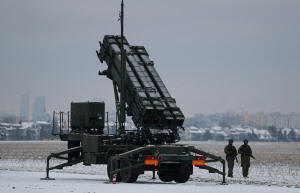Ukraine war orders starting to boost revenues for big US defense
contractors
 Send a link to a friend
Send a link to a friend
 [October 27, 2023] By
Mike Stone [October 27, 2023] By
Mike Stone
WASHINGTON (Reuters) - The Russian invasion of Ukraine in 2022 is
starting to boost defense contractors' revenues, as customers such as
the U.S. government restock supplies shipped to Ukraine and countries
around Europe arm themselves with an eye on Moscow's aggressions.
U.S. defense contractors such as Lockheed Martin, General Dynamics and
others expect that existing orders for hundreds of thousands of
artillery rounds, hundreds of Patriot missile interceptors and a surge
in orders for armored vehicles expected in the months ahead will
underpin their results in coming quarters.
New contracts to supply Ukraine directly - or backfill U.S. weapons sent
to Ukraine - were signed late last year, and now revenue is flowing to
the big defense contractors. Lockheed, General Dynamics and RTX all
reported better than expected results over the past several days, and
executives expect both the conflict in Ukraine and Israel's war with
Palestinian militant group Hamas to drive up near-term demand.
"We've gone from 14,000 (artillery) rounds per month to 20,000 very
quickly. We're working ahead of schedule to accelerate that production
capacity up to 85,000, even as high as 100,000 rounds per month," Jason
Aiken, General Dynamics' chief financial officer, said on a call with
Wall Street analysts on Wednesday.

"And I think the Israel situation is only going to put upward pressure
on that demand."
The General Dynamics' Combat Systems unit, which makes armored vehicles,
tanks and the artillery Ukraine uses, saw its revenue rise almost 25%
versus the same period a year ago.
RTX, which makes AMRAAM rockets used in Ukraine, said on Tuesday's
earnings call with Wall Street analysts it has received $3 billion of
orders since Russia's February 2022 invasion that are related to
replenishing Ukraine and U.S. war stocks, and the company expects more.
Third-quarter sales for Northrop Grumman's Defense Systems segment rose
6% on high demand for ammunition and rocket motors used in guided
multiple-launch rocket systems (GMLRS), which play a crucial role in
supporting Ukraine's defense efforts against Russian forces.
[to top of second column] |

Servicemen patrol in front of the Patriot air defence system during
Polish military training on the missile systems at the airport in
Warsaw, Poland February 7, 2023. REUTERS/Kacper Pempel//File Photo

This is part of a global trend. Sweden's Saab raised its full-year
sales outlook on Thursday on the back of strong defense demand and
Germany's Rheinmetall said third-quarter profit jumped on strong
demand for weapons and ammunition.
During his latest request for $106 billion in new funds for Ukraine,
Israel, the Indo-Pacific region and border enforcement, U.S.
President Joe Biden on Oct. 20 said some of the supplemental request
would go to companies that backfill production of U.S. weapons sent
abroad. Biden mentioned Patriot missiles made in Arizona, and
"artillery shells manufactured in 12 states across the country,"
naming Pennsylvania, Ohio and Texas.
To be sure, executives from several defense firms at a recent trade
show cautioned that a lack of skilled labor and supply chain issues
continue to hamper companies' capacity to fill orders.
"The supply chain, to be completely candid with you, remains, and I
think we expect to remain what I call fragile," General Dynamics's
Aiken said on the earnings call, as the company said it was cutting
its forecast for 2023 business jet deliveries. "I don't think that's
going to get back to what we saw pre-pandemic for the foreseeable
future."
Lockheed on Oct. 17 said supply and labor disruptions are affecting
divisions like aeronautics, which makes the advanced F-35 fighter
jet, due to the need for processor assemblies, solid-rocket motors,
castings and forgings.
(Reporting by Mike Stone in Washington; Editing by Rod Nickel)
[© 2023 Thomson Reuters. All rights
reserved.]
This material may not be published,
broadcast, rewritten or redistributed.
Thompson Reuters is solely responsible for this content.
 |